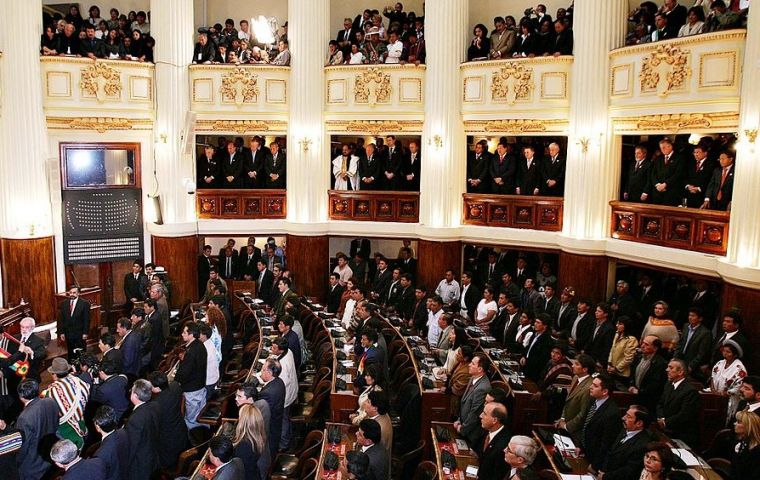MercoPress. South Atlantic News Agency
Bolivia's Assembly fails to move on with Mercosur joining protocol
 It was not the first time the Mercosur issue was prevented from being debated upon
It was not the first time the Mercosur issue was prevented from being debated upon The Lower House of Bolivia's Plurinational Legislative Assembly (ALP) Thursday failed to approve the country's accession to the Southern Common Market (Mercosur) after Speaker Israel Huaytari adjourned the session during which the matter was to be debated. Lawmakers loyal to former President Evo Morales are said to oppose the “Protocol of Accession of the Plurinational State of Bolivia to Mercosur” initiative.
The plenary gathering could not go on over discrepancies regarding other bills, it was also reported from La Paz, where the 130-member parliamentary body sits.
The Movimiento al Socialismo (MAS) of now arch-rivals Morales and President Luis Arce Catacora demanded other bills on the extension of the magistrates' term in office be treated before moving on to other issues such as the Mercosur one but there was no consensus on the matter.
In this scenario, Huaytari ordered a round of voting to ratify the agenda or suspend the session. It was not the first time the ALP was unable to move forward with the consideration of the Mercosur initiative. Huaytari had foreseen this deadlock and recalled that the Senate had insisted on voting the two bills regarding magistrates in an ALP Plenary Session and therefore it was not for the Lower House to take on the question solo.
”Today we are going to meet and we will see the climate, each assembly member will express himself, we will see what the situation will be (but) there is a resolution of the Senate that it should be dealt with in the plenary (of the ALP), that prevents me from dealing with it,“ he had said.
On Thursday morning House of Deputies Acting Speaker Verónica Chalco had announced that the Mercosur question was sixth on the day's agenda.
”In accordance with numeral 14 of Paragraph 1 of Article 158 of the Political Constitution of the State, paragraph b) of Paragraph 1 of Article 33 and Article 37 of Law No. 401, of September 18, 2013, on the Conclusion of Treaties, the 'Protocol of Accession of the Plurinational State of Bolivia to Mercosur', signed in the city of Brasilia, Federative Republic of Brazil, on July 17, 2015, and whose text is part of the present Law, is ratified,“ reads the bill that still needs Congressional ratification. If approved, it should then pass on to the Senate.
The Lower House's March 26 session also amounted to a legislative fiasco when the Mercosur question was to be treated but there was no consensus on the day's agenda.
According to the protocol, ”Bolivia will adopt, gradually, the normative acquis in force of Mercosur (Southern Common Market), at the latest in four years, counted from the date of entry into force of this instrument“ and must ”adopt the Mercosur Common Nomenclature, the Common External Tariff and the Mercosur Regime of Origin” within the next four years.
Bolivia's accession to the bloc already made up of Argentina, Brazil, Paraguay, and Uruguay was approved on Dec. 7, 2023, during a Summit in Rio de Janeiro when host Luiz Inácio Lula da Silva passed on the alliance's rotating presidency to Paraguay's Santiago Peña.




Top Comments
Disclaimer & comment rulesCommenting for this story is now closed.
If you have a Facebook account, become a fan and comment on our Facebook Page!